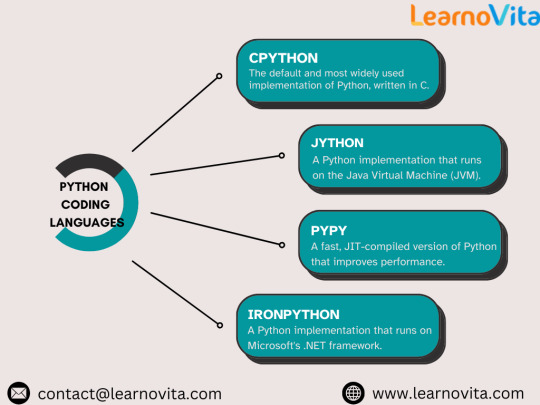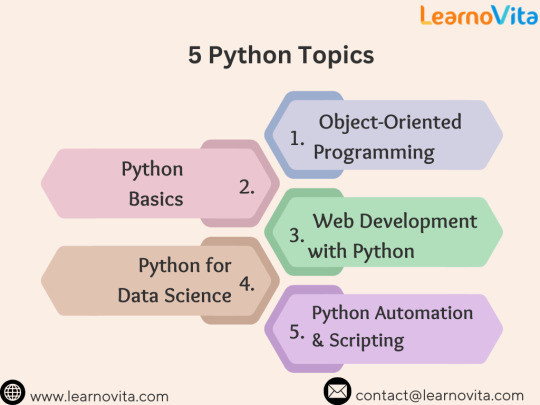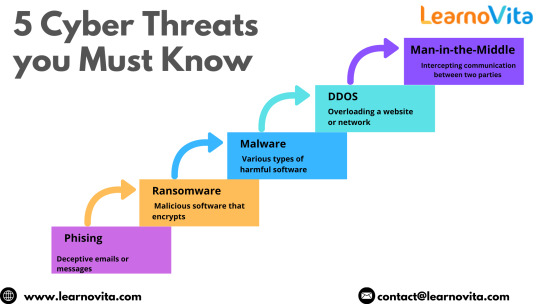Don't wanna be here? Send us removal request.
Text
Why Python is the Ultimate Language for Developers on Tumblr
Python has grown into one of the most popular programming languages, loved for its simplicity, versatility, and power. Whether you're a beginner trying to break into coding or an experienced developer working on complex projects, Python offers endless possibilities. From web development and automation to data science and artificial intelligence, Python has carved its place in almost every tech industry. Its widespread adoption and strong community support make it an essential skill for modern programmers.

A Simple and Readable Language
One of Python’s biggest advantages is its clean and easy-to-read syntax. Unlike other programming languages that require complex structures, Python focuses on simplicity, allowing developers to write fewer lines of code while achieving the same results. This readability makes Python beginner-friendly and helps maintain large projects without confusion. Because of its intuitive nature, Python is often the first language taught to aspiring programmers, making the transition into software development smoother.
Building Websites with Python
For web developers, Python offers powerful frameworks like Django and Flask. Django is a high-level framework that provides built-in features like authentication, database integration, and security protocols, allowing developers to build fully functional web applications efficiently. On the other hand, Flask is a lightweight alternative that gives developers more flexibility while keeping the core essentials for web development. Whether you're creating a personal blog, an e-commerce platform, or a large-scale social media site, Python’s web development tools have you covered.
Python’s Role in Data Science and AI
Python has revolutionized the fields of data science and artificial intelligence. With libraries like Pandas and NumPy, handling large datasets has never been easier. Data visualization tools like Matplotlib and Seaborn help bring raw data to life with insightful graphs and charts. For AI and machine learning, Python offers frameworks such as TensorFlow and PyTorch, enabling the development of complex models for automation, prediction, and intelligent systems. From chatbots to recommendation engines, Python powers some of the most advanced technologies used today.
Automating Tasks with Python
Python isn’t just for large-scale projects—it’s also perfect for small tasks and automation. Many professionals use Python scripts to automate repetitive jobs, such as renaming files, sending emails, or scraping data from websites. Tools like Selenium allow users to automate web interactions, while BeautifulSoup makes web scraping effortless. With Python, you can simplify everyday tasks and boost productivity with just a few lines of code.

A Thriving Community and Open-Source Support
Python’s success wouldn’t be possible without its massive open-source community. Developers worldwide contribute to Python’s ecosystem by creating new libraries, frameworks, and tools. Whether you're stuck on a problem or looking for new ideas, platforms like GitHub, Stack Overflow, and Reddit provide valuable resources and discussions. The strong community ensures that Python remains up to date and continuously evolves to meet the demands of the tech world.
Python’s Bright Future
As technology advances, Python continues to grow and adapt. Companies like Google, Instagram, and Spotify rely on Python for various applications, proving its relevance in modern software development. With the rise of AI, automation, and big data, Python’s role will only become more significant. Whether you're looking to build web applications, analyze data, or automate processes, Python is the ultimate language that will remain in demand for years to come.
Final Thoughts
Python is more than just a programming language—it’s a gateway to innovation and efficiency. Its simplicity, power, and broad range of applications make it the go-to language for developers across different industries. Whether you're coding for fun, learning new skills, or working on high-end projects, Python is a must-know tool in today’s digital world. If you haven’t started your Python journey yet, now is the perfect time to dive in and explore its limitless possibilities!
0 notes
Text
The Language Powering the Future of Tech
Python is more than just a programming language—it’s a movement that’s transforming industries and redefining technology. From web development and artificial intelligence to automation and data science, Python is shaping the way we interact with the digital world. Its simplicity, flexibility, and powerful capabilities make it the go-to language for both beginners and experienced developers.
1. Why Python’s Simplicity Stands Out
Python is known for its clean, human-friendly syntax, making it easier to learn and use compared to many other programming languages. It allows developers to write readable and efficient code, which means less time spent debugging and more time creating. Whether you're a coding newbie or an expert, Python’s ease of use makes it a powerful tool for bringing ideas to life. Joining a trusted Python online course equips individuals with the critical skills and expertise needed to thrive in this rapidly evolving field.

2. Python’s Reach Across Industries
Python is everywhere, driving innovation in different sectors:
Web Development: Django and Flask help developers create dynamic, scalable web applications.
Artificial Intelligence & Machine Learning: Python is the foundation of AI research, with libraries like TensorFlow and PyTorch leading the way.
Data Science & Analytics: Python simplifies data analysis, visualization, and processing, empowering businesses to make smarter decisions.
Automation & Productivity: From automating repetitive tasks to managing workflows, Python is an efficiency booster for professionals.
Cybersecurity & Ethical Hacking: Python plays a crucial role in security research, ethical hacking, and digital forensics.
3. Python in Cutting-Edge Tech
Python is shaping the future by powering innovations in:
Internet of Things (IoT): Smart devices communicate seamlessly using Python, making homes and workplaces more connected.
Blockchain Development: Python enables the development of decentralized apps and secure digital transactions.
Cloud Computing & DevOps: Cloud services rely on Python to automate infrastructure, deployment, and scaling.
Quantum Computing: Python is playing a role in the development of quantum technology, pushing the boundaries of science.
4. A Thriving Python Community
One of Python’s biggest strengths is its vast and supportive global community. Whether you’re learning the basics or working on advanced projects, Python enthusiasts worldwide share knowledge, collaborate on open-source projects, and help each other grow. The support from this community makes learning Python more engaging and accessible. With the Best Online Training & Placement Programs, you’ll master the skills to detect phishing emails, protect your personal data like a pro, and stay ahead of evolving cyber threats.

5. The Demand for Python Experts
Python is in high demand, with job opportunities spanning across industries like tech, finance, healthcare, and entertainment. Companies such as Google, Amazon, and Netflix actively seek Python developers for roles in software development, AI, data science, and automation. Mastering Python can open up endless career opportunities and future-proof your skillset.
6. Getting Started with Python
The best way to learn Python is through hands-on experience. Start with online courses, experiment with small projects, and dive into coding challenges. As you progress, contribute to open-source projects, engage with Python communities, and stay updated with the latest trends. The key is consistency—practice daily, explore real-world applications, and never stop learning.
Final Thoughts
Python isn’t just a programming language—it’s a gateway to endless possibilities. Whether you want to build websites, analyze data, automate tasks, or dive into AI, Python is your key to the future. With its versatility, ease of learning, and strong community, Python empowers anyone to turn ideas into reality. Now’s the time to start your Python journey and be a part of the innovation shaping the world!
0 notes
Text
Python: The Silent Power Behind the Digital Revolution
In a world obsessed with cutting-edge technology, there’s one language quietly running the show Python. It’s not flashy. It doesn’t try to be overly complicated. But that’s exactly why it’s everywhere, powering everything from the apps we use daily to groundbreaking advancements in artificial intelligence.
Simplicity Meets Power
Some programming languages feel like cryptic puzzles, filled with symbols and jargon that scare off newcomers. Python is different. It’s designed to be readable, intuitive, and beginner-friendly, making it an ideal choice for both new learners and seasoned developers. Yet, beneath its simplicity lies an incredible level of power, making it a favorite among industry professionals and hobbyists alike. Its clean syntax ensures that developers can write code faster and more efficiently, reducing development time and increasing productivity.
Enrolling in a trusted Python Online Course equips individuals with the vital skills and expertise needed to succeed in this fast-paced and ever-changing field.

From Websites to AI—Python Does It All
Python isn’t just another coding language; it’s a universal tool shaping multiple industries. Whether you're a web developer, data scientist, or software engineer, Python provides the tools and flexibility needed to build innovative solutions.
Web Development: Python is the backbone of many major websites, helping developers build powerful platforms with frameworks like Django and Flask. These frameworks allow for quick development, robust security, and scalable applications.
Data Science & Analytics: Python simplifies analysis, making it easier to process massive amounts of information. With libraries like Pandas, NumPy, and Matplotlib, professionals can visualize trends, analyze big data, and make data-driven decisions.
Machine Learning & Artificial Intelligence: AI relies on Python to develop smarter systems, from facial recognition and chatbots to predictive analytics and self-driving cars. Libraries like TensorFlow, PyTorch, and Scikit-learn make machine learning accessible and powerful.
Cybersecurity & Ethical Hacking: Even cybersecurity experts turn to Python for automation, penetration testing, and detecting security threats. With tools like Scapy and PyCrypto, professionals can enhance security measures and combat cyber risks.
Automation & Scripting: Python is widely used for automating repetitive tasks, such as web scraping, file management, and system monitoring. Whether you're a business professional or an IT administrator, Python can help streamline workflows.
A Global Community That Never Stops Growing
Beyond its technical capabilities, one of Python’s biggest strengths is its community. Millions of developers worldwide contribute to open-source projects, build new libraries, and provide support through forums, tutorials, and online courses. Learning Python means gaining access to a vast ecosystem of knowledge and collaboration, making it easier than ever to solve problems and develop new ideas. Whether you’re troubleshooting an issue on Stack Overflow, taking an online course on Coursera, or contributing to an open-source project on GitHub, Python’s community is always there to help.
Python in Education: A Perfect Language for Beginners
Python has become the preferred language for programming education due to its simple syntax and real-world applications. Universities, schools, and coding boot camps worldwide use Python to teach programming concepts, making it the first step for many aspiring developers. It’s also widely used in research and academia for scientific computing, simulations, and artificial intelligence studies. With the Best Online Training & Placement Programs, you’ll master the skills to detect phishing emails, protect your personal data like a pro, and stay ahead of evolving cyber threats.

A Language Built for the Future
Technology is evolving at an unprecedented pace, and Python is evolving with it. Startups and tech giants alike are integrating Python into everything from blockchain to automation to quantum computing. With the rise of cloud computing and DevOps, Python plays a crucial role in managing infrastructure, automating deployments, and handling serverless computing.
Additionally, the demand for Python developers continues to grow, making it one of the highest-paying programming languages in the job market. Companies like Google, Netflix, Facebook, and NASA use Python to build and maintain their innovative technologies, proving that Python isn’t just a language—it’s a driving force behind the modern digital world.
Why You Should Learn Python Today
Whether you’re looking to start a new career, automate tasks, build web applications, dive into AI and data science, or contribute to open-source projects, Python opens the door to endless possibilities. Its versatility, ease of learning, and strong community support make it the perfect programming language for both beginners and experienced developers.
0 notes
Text
Stay Safe Online: Cybersecurity Matters More Than Ever
Cybersecurity: Why Online Safety Matters More Than Ever
The digital landscape is full of opportunities, but it also presents growing security risks. Cybercriminals constantly devise new ways to steal data, exploit vulnerabilities, and invade personal privacy. From financial fraud to identity theft, the dangers of the online world are ever-present. Many people believe cybersecurity is only for tech experts, but in reality, it’s something everyone must take seriously. Joining a trusted Cyber Security Online Training & Placement program provides individuals with the critical skills and expertise required to thrive in this fast-paced and ever-evolving field.

The Growing Threat of Cybercrime
Cyberattacks come in many forms, each designed to exploit weaknesses in security systems. Some of the most common cyber threats include:
Phishing Attacks – Fraudulent emails or messages that trick users into providing personal information, passwords, or financial details.
Ransomware – Malicious software that encrypts files and demands a ransom for their release.
Data Breaches – Large-scale theft of personal and financial information from organizations and online platforms.
Social Engineering – Manipulative tactics that trick individuals into sharing confidential details or clicking on malicious links.
Malware and Spyware – Programs that infiltrate devices to steal data, monitor activity, or disrupt operations.
IoT Vulnerabilities – Internet-connected devices, such as smart home gadgets, can be hacked if not properly secured.
As cyber threats become more sophisticated, attackers use advanced techniques to bypass security defenses. This makes it crucial for individuals and businesses to adopt strong cybersecurity measures.
Simple Yet Effective Ways to Stay Secure Online
While cyber threats are constantly evolving, you can significantly reduce your risk by implementing a few simple precautions:
Use Strong, Unique Passwords – Avoid using the same password across multiple accounts. A mix of uppercase letters, numbers, and symbols makes passwords harder to crack.
Enable Multi-Factor Authentication (MFA) – Adds an extra layer of protection by requiring a second form of verification.
Keep Software and Devices Updated – Security updates patch vulnerabilities that hackers may exploit.
Be Cautious of Suspicious Emails and Links – Phishing attacks often look like legitimate messages but are designed to steal data.
Use Secure Wi-Fi and VPNs – Avoid using public Wi-Fi for sensitive transactions, and use a Virtual Private Network (VPN) for added security.
Back Up Important Data Regularly – In case of a ransomware attack, having a backup ensures you don’t lose essential files.
Limit Personal Information Shared Online – The more information available about you, the easier it is for hackers to target you.
Educate Yourself and Others About Cybersecurity – Awareness is the first step in preventing cyberattacks.
With the Best Online Training & Placement Programs, you’ll master the skills to detect phishing emails, protect your personal data like a pro, and stay ahead of evolving cyber threats.

Why Businesses Must Prioritize Cybersecurity
For businesses, cybersecurity is even more critical. A single data breach can result in financial losses, legal consequences, and reputational damage. Companies must adopt enterprise-level security solutions, such as:
Network Security Measures: Firewalls, intrusion detection systems, and encrypted communications help prevent unauthorized access.
Employee Cybersecurity Training: Employees should be educated on best practices to recognize and prevent cyber threats.
Incident Response Plans: Having a strategy in place ensures quick action in case of a security breach.
Regular Security Audits: Conducting audits helps identify vulnerabilities before they can be exploited.
The Future of Cybersecurity
As technology continues to advance, so do cybersecurity measures. Artificial intelligence (AI) and machine learning are now being used to detect and prevent cyber threats in real time. Blockchain technology is helping to secure financial transactions, and cloud security solutions are improving data protection.
Governments and organizations worldwide are also implementing stricter cybersecurity regulations to safeguard sensitive data. However, as security defenses improve, cybercriminals continue to evolve their tactics. This makes continuous learning and adaptation essential for staying protected.
Final Thoughts
Cybersecurity is not just a concern for IT professionals—it affects everyone who uses the internet. Staying informed, following best practices, and taking proactive measures can protect both individuals and businesses from cyber threats. By making cybersecurity a priority, you can safeguard your personal data, financial information, and online privacy in an increasingly connected world.
0 notes
Text
Beyond the Earnings: The Surprising Benefits of a Career in Cybersecurity
Cybersecurity is one of those careers that sounds either super cool or super intimidating sometimes both. If you’ve ever thought about getting into it, you’ve probably heard the usual perks: great salary, job security, and the satisfaction of outsmarting hackers. But let’s talk about the real reasons why cybersecurity is one of the most underrated (and weirdly fun) careers out there.
1. You Get to Be a Professional Trouble-Maker (Legally!)
If you’ve ever been the kid who took apart the family computer just to see how it worked, or the one who figured out how to bypass school WiFi restrictions (no judgment), cybersecurity might just be your calling. Ethical hackers (yes, that’s a real job) get paid to break into systems legally to help companies patch security holes. Enrolling in a reputable Cyber Security Online Training & Placement program can equip individuals with the essential skills and knowledge needed to excel in this dynamic and evolving field.

2. No Suit, No Problem—Work in Pajamas If You Want
Cybersecurity is one of the most remote-friendly careers out there. Many roles let you work from home, a coffee shop, or even while traveling. As long as you have a solid internet connection and your laptop, you’re good to go. Bonus: You get to skip the daily commute and wear whatever you want (yes, even that hoodie you’ve had since high school).
3. It’s Not Just a Job, It’s a Superpower
Once you start working in cybersecurity, you’ll never look at the internet the same way again. You’ll spot phishing scams a mile away, know exactly how to lock down your personal data, and never fall for those “Congrats! You won an iPhone!” pop-ups. You become the person your friends call when they think they’ve been hacked (which, honestly, can be both a blessing and a curse).
4. No Degree? No Problem!
Unlike a lot of high-paying jobs, cybersecurity doesn’t always require a college degree. Many people break into the field through self-study, certifications, and hands-on experience. If you love problem-solving and figuring things out on your own, you can learn the skills needed without spending years in school (and without drowning in student debt).
5. You’ll Never Be Bored (Seriously, Never)
Cyber threats are constantly evolving, which means your job will never be the same two days in a row. One day you might be analyzing malware, the next you’re investigating a security breach. If you hate routine and love a good challenge, cybersecurity is the perfect playground. When you work in cybersecurity, you don't just protect businesses you also learn how to safeguard your own digital life. Through Best Online Training & Placement Programs, you'll be the one spotting phishing emails before they trick you, securing your personal data like a pro, and staying ahead of cyber threats.

6. You’re Actually Making the Internet a Safer Place
This is the part people don’t talk about enough: cybersecurity isn’t just about stopping hackers. It’s about protecting people, businesses, and even entire governments from cyber threats. Whether you’re preventing financial fraud, safeguarding personal data, or keeping companies from being held hostage by ransomware, your work has real-world impact.
7. The Community is Wildly Supportive
The cybersecurity world is filled with people who love to share knowledge. Whether it’s through online forums, Capture The Flag (CTF) competitions, or Twitter threads breaking down the latest hacks, you’ll find a community that genuinely enjoys helping newcomers get started. No gatekeeping, just nerds supporting nerds.
0 notes
Text
Why AWS is a Game Changer for Your Cloud Journey
If you’ve been diving into the world of cloud computing, chances are you’ve heard of AWS (Amazon Web Services). It’s the go-to platform for everything from small startups to massive enterprises. But what’s all the hype about? Why is AWS so popular? Let’s break it down!
What Exactly is AWS?
Simply put, AWS is a cloud platform that gives you access to a bunch of powerful services like computing power, storage, databases, and machine learning tools. Instead of dealing with physical servers or complex IT setups, you can run your business or app directly in the cloud. And the best part? It's scalable, flexible, and super secure.

Why Should You Care About AWS?
Here are some reasons AWS is a big deal:
Super Scalable: As your business grows, you can easily increase your cloud resources with a few clicks—no need to worry about capacity issues!
Cost-Effective: Pay for what you use. No huge upfront costs like traditional hardware—just what you need, when you need it.
Top-Notch Security: With built-in encryption and a ton of compliance certifications, your data stays protected.
Global Reach: AWS runs data centers all over the world, meaning faster, more reliable performance wherever your users are.
Cutting-Edge Services: AWS is constantly rolling out cool new features like AI, machine learning, and advanced data analytics. Basically, it’s perfect for staying ahead in today’s tech-driven world.
Must-Know AWS Services
1. EC2 (Elastic Compute Cloud)
Think of EC2 as your customizable virtual server. Whether you need a small instance for a project or a beefy one to handle high traffic, EC2 lets you scale on demand.
2. S3 (Simple Storage Service)
Need storage? S3 is your best friend. It’s a flexible, secure storage service that scales automatically and is perfect for large files (like photos, videos, or backups).
3. Lambda
Forget managing servers. Lambda lets you run code without worrying about infrastructure. It’s great for event-driven apps (like those microservices or serverless setups you keep hearing about).
4. RDS (Relational Database Service)
If you need to manage a database (and who doesn’t?), RDS makes it easy. It automates the boring stuff like backups and scaling, so you can focus on building your app.
5. VPC (Virtual Private Cloud)
Set up your own private network with VPC. Think of it as your cloud’s “secure zone,” where you control who gets in and what they can access.

How AWS Helps Different Businesses
Startups & Small Biz
Startups don’t have to worry about investing in hardware. You pay only for what you use, and you can scale as you grow. Imagine running a new app without a giant upfront cost or IT infrastructure to manage. Sounds dreamy, right?
Enterprises & Large Companies
AWS scales up to handle massive workloads. Need to manage huge databases or run advanced AI models? AWS can handle it all. Plus, it’s compliant with global regulations, so you don’t have to worry about security.
Developers & DevOps
For developers, AWS offers tools to streamline development, from building apps to deploying them automatically. Whether it’s using Elastic Beanstalk for app deployment or CodePipeline to automate the release process, AWS makes life easier.
How to Get Started with AWS
Create Your AWS Account: It’s super simple to sign up. Once you’re in, you’ll have access to all AWS services.
Explore the Free Tier: AWS has a free tier that lets you try many services without paying a cent. Perfect for beginners!
Check Out the Docs: AWS has detailed tutorials and resources to guide you through setting up and using their services.
Scale When You’re Ready: As your needs grow, you can scale up your services without breaking a sweat.
Final Thoughts
AWS is changing the game when it comes to cloud computing. With its powerful features, scalability, and security, it’s no surprise that so many businesses trust it to run their operations. Whether you're just starting out or scaling big, AWS has everything you need to succeed.
So, what are you waiting for? Dive into the cloud with AWS and take your business (or project) to the next level.
1 note
·
View note